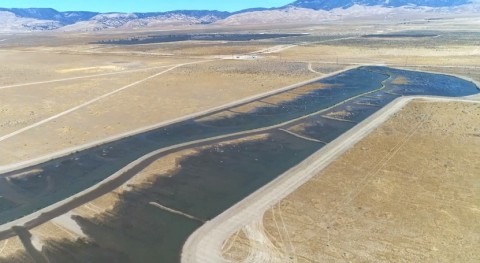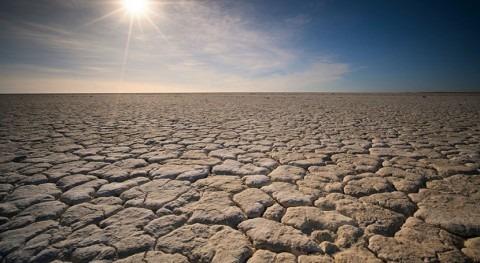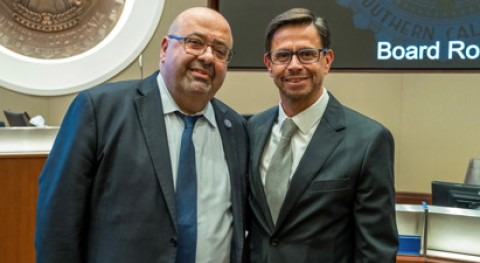As drought continues to stress the state’s water supply, Metropolitan Water District took new actions to ensure Southern Californians have the water they need.
The actions, approved by Metropolitan’s Board of Directors, include new infrastructure investments and water exchanges with other agencies that will allow Colorado River water and stored supplies to be more readily distributed throughout the region. The strategies will preserve limited State Water Project supplies for areas, including parts of Ventura, Los Angeles and San Bernardino counties, that depend heavily on water from that system.
“We’re entering the third year of drought in California. And while we hope conditions will improve this winter, we’re doing everything we can to ensure the entire region has reliable water if drought continues,” Metropolitan board Chairwoman Gloria D. Gray said.
Southern California gets on average 30 percent of its water from the northern Sierra via the State Water Project. But drought has slowed those deliveries to a trickle. While much of the region can turn to Colorado River water or their own local supplies, some communities aren’t physically connected to the Colorado River supply and have limited local supplies, leaving them much more challenged by the state’s severe drought conditions.
Under an agreement approved with the San Bernardino Valley Municipal Water District, the agency will make up to 7,000 acre-feet of its State Water Project supplies available to these communities in early 2022. In exchange, Metropolitan will later return those SWP supplies to Valley District. Metropolitan will also pay the cost of Valley District’s shift to more groundwater, making other SWP supplies available. In addition, Valley District will provide up to 1,000 acre-feet per month of local groundwater to Metropolitan that can be delivered to State Water Project-dependent communities. Metropolitan will cover the costs of receiving the water and returning a like-amount in the future.
Together, this agreement could provide enough water to serve more than 50,000 homes in 2022.
“We really value the collaborative partnership we enjoy with Metropolitan,” commented Valley District CEO/General Manager Heather Dyer. “The wholesale water agencies of our region need to work together strategically to make every drop of water count during these very challenging water conditions. We look forward to working together in creative ways to help each other wherever possible.”
Metropolitan’s board also approved an agreement with the San Diego County Water Authority
Metropolitan’s board also approved an agreement with the San Diego County Water Authority under which Metropolitan will purchase 4,200 acre-feet of groundwater the SDCWA has stored in the Semitropic Water Bank in Kern County. This water can be delivered to the SWP-dependent communities that need it because the Semitropic Water Bank is located along the state project system. In addition, Metropolitan will lease 5,000 acre-feet of the SDCWA’s “take capacity” – a function of groundwater pumping and distribution size – allowing Metropolitan to withdraw more of its own groundwater stored in the Semitropic Water Bank. Together, the agreement allows for 9,200 acre-feet of additional water to be delivered to SWP-dependent areas – enough to serve nearly 30,000 homes for a year.
Looking to a longer-term solution, Metropolitan’s board also voted to advance infrastructure improvements that would allow water stored in its Diamond Valley Lake in Riverside County and, potentially, Colorado River water, to be moved to some of these State Water Project-dependent areas that cannot currently receive that water source. The action allows project planning and preliminary design to begin on three different projects, which range in cost from $10 million to $26 million. Construction on two of the projects could start by the middle of next year.
These actions build on steps taken by Metropolitan earlier this year to bring greater reliability to the SWP-dependent areas, including infrastructure improvements and partnerships with Metropolitan’s member agencies to shift to using Colorado River water instead of state project water, leaving it for others.
“This drought revealed some system improvements we can take to provide more equal water reliability to all of Southern California,” Metropolitan General Manager Adel Hagekhalil said. “We’re taking actions in the immediate-term, mid-term and long-term through our One Water approach, and we’re grateful to our partners for their help.”
Hagekhalil stressed that the board actions, and today’s rainfall, don’t mean people should stop conserving.
“These new investments and partnerships are going to help improve reliability for the entire region. And the storms hitting our state this week will certainly help too. But many of our state reservoirs are very low, and we all need to keep using water as efficiently as possible. It is only by working together that we’ll get through this,” he said. “That includes our state and federal partners. We need their financial support to accelerate projects in water efficiency, recycling and storage. Climate change is creating a new normal, and while we’ve done a lot, we need to do more, working together as one.”













